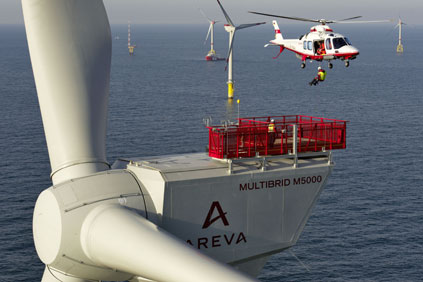The UK has raised the payment rate for its own offshore generated electricity by €0.03 to €0.18/kWh, UK offshore wind stations are now more lucrative than German offshore wind stations, for which electricity commands a rate of €0.015/kWh.
This has prompted Scottish energy company Scottish & Southern Energy (SSE) to drop its 388MW Butendiek development and all other German offshore projects "overnight", says the Butendiek limited commercial partnership company in its first newsletter of 2010.
Butendiek developed the 388MW offshore project before selling it - while retaining an advisory role and with an option for a future involvement - to Airtricity in 2007, which in turn was taken over by SSE. The newsletter states SSE has been trying to sell the Butendiek project for the last six months.
SSE said it was unable to comment on individual projects. However, it highlighted comments in its recent annual report that it planned to take a "flexible approach" to the development of its wind energy capacity "with both acquisitions and disposals".
Up to autumn 2009, SSE has pursued the Butendiek project "with all vehemence," says the partnership. A preliminary contract was signed with Siemens for supply of eighty 3.6MW turbines and tenders issued for wind station cabling, for the transformers station at sea, and for port facilities at Ejsbjerg and Rømø.
Total costs for the station now amount to over €3 million/MW. "This figure is no surprise, but with such costs the chance of a sufficient return for the Scots or for us does not exist," says the Butendiek commercial partnership.
SSE was also pursuing five other German offshore projects, all at a much earlier stage of development with together 2GW.
Developments in connection with Butendiek, but also for offshore wind altogether, and cost escalation "is very sobering." Offshore has become "a playground for the major energy groups," it states.
In 2005/2006, Butendiek could have been built profitably for €0.09/kWh, the newsletter states. In the meantime, despite a German payment of €0.15/kWh and the shouldering of cable connection costs by the transmission system operators to the tune of €0.03/kWh – "it seems this is still not enough."
It adds: "Although we still think offshore is a necessary option, we would like to point out that decentrally-generated onshore wind energy paid for at €0.06-0.09/kWh depending on location is the significantly cheaper option."
The news comes at a difficult time for the German offshore sector. Recent problems with its Alpha Ventus wind farm, which saw two of its six turbines fail.

.png)


.png)










